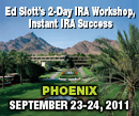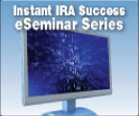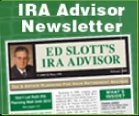A 10% early withdrawal penalty applies to taxable funds withdrawn from a traditional IRA before the account owner attains age 59 ½ unless an exception applies. The same penalty (with its own set of exceptions) also applies on distributions made from most employer-sponsored retirement plans, unless the payment is due to the participant’s separation from service in a year in which he or she attains age 55 or older. One situation in which no penalty applies is when funds are withdrawn in order to convert to a Roth IRA (or to a Roth arrangement within a 401(k), 403(b), or 457(b)). Even though no penalty applies, the converted funds are subject to ordinary income tax to the extent they are not a return of after-tax contributions. But, two tax traps that will trip up an unsuspecting consumer can still trigger the 10% penalty.
The first trap is when funds withdrawn from the traditional IRA are used to pay the conversion tax. That’s a bad move. Funds used to pay the conversion tax are not actually converted to the Roth, so they will be subject to the 10% penalty, in addition to income tax, when the consumer is under the age of 59 ½.
The second trap occurs when funds converted to the Roth are withdrawn within the first five years and the Roth IRA owner is still under age 59 ½ and no exception applies. This means you can’t avoid the 10% penalty by first converting to a Roth IRA and then withdrawing converted funds to pay the tax.
In general, using IRA funds to pay a conversion tax is a bad idea from two perspectives: (1) less money goes into your Roth IRA to grow tax-free, and (2) paying a 10% penalty is an extremely costly tax move. Thus, it’s prudent to make sure you have sufficient non-IRA funds to pay the conversion-related income tax before considering a Roth conversion.
By IRA Technical Consultant Marvin Rotenberg and Jared Trexler
------------------------------------------------------------------------------
Comment, Question, Discussion Topic on your mind? Click on the Blue Comment Link below and leave your thoughts then check back to see what other consumers and advisors think.
*Copyright 2011 Ed Slott and Company, LLC
Quality content
- Siti Non Aams
- Nuovi Siti Casino
- Casino Non Aams Italia
- Casinos Not On Gamstop
- Casino Sites Not On Gamstop
- Online Casino
- UK Casino Not On Gamstop
- Sites Not On Gamstop
- Casino En Ligne
- Casino En Ligne Fiable
- Casinos Not On Gamstop
- UK Casino Not On Gamstop
- Casino Sites Not On Gamstop
- Non Gamstop Casinos UK
- Casino Online Non Aams
- Casino Not On Gamstop
- Meilleur Casino En Ligne France
- Casino Sites Not On Gamstop
- Non Gamstop Casino Sites UK
- Casino Sites UK Not On Gamstop
- UK Casino Not On Gamstop
- Meilleur Casino En Ligne Fiable
- Casino Online Non Aams
- Casino Non Aams
- Casino Non Aams
- Casino Sites Not On Gamstop
- Migliori Casino Non Aams
- Meilleur Casino En Ligne Belgique
- Lista Casino Online Non Aams
- Casino Non Aams
- オンカジ出金早い
- 안전한 파워볼사이트
- Meilleur Casino En Ligne 2026
- Meilleur Casino En Ligne 2026
- Meilleur Casino En Ligne
- Casino Senza Richiesta Documenti
- Nuovi Casino Italiani
- Casino Online France
- Casino En Ligne




2 comments:
In "The Gospel of Roth- The Good News About Roth IRA Conversions and How They Can Make You Money" by John Bledsoe it clearly states in the book that NO ANALYSIS is needed and that everyone should convert to a Roth IRA regardless of income. There is NO risk! The IRS is giving us a year to recharacterize or "undo" the conversion. This book gives the ins and outs for Roth IRAS! It really helped answer all my questions.
I convert all my retirement saving (a roll-over IRA from a 401k in 2002)to a Roth IRA in 2010. I have elected to pay the taxes on 1/2 in 2011 (157,500.00) & 1/2 in 2012($157,500.00). I turn 59.5 in Feb-2011. I have the funds invested in a hi-income bonds fund that pays a month dividend on the # of shares. Will I have to pay a 10% IRS penalty if I use the roll over Roth contribed funds ( non earnings)? In 2012 tax year will I have a problem with not have enought taxes withheld? Thanks DRW
Post a Comment